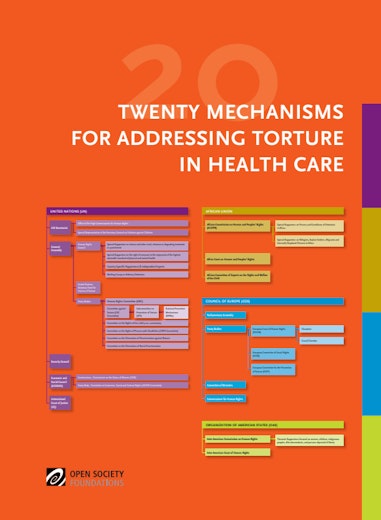Top UN Expert on Torture Demands an End to Abuses in Health Care
By Lydia Guterman
A few of the many people like them across the world have told their stories:
- Hilma is sterilized without her consent because she has HIV.
- Vlad is left to die in pain because of needless restrictions on medicines.
- Venta is beaten and abused in a drug “treatment” center.
Now, the international community is listening.
In a landmark new report presented today to the United Nations Human Rights Council, the UN Special Rapporteur on Torture Juan Mendez says that severe abuses in health care settings amount to cruel, inhumane, and degrading treatment—and even torture. The Open Society Foundations and the Campaign to Stop Torture in Health Care welcome this conclusion, which places immediate legal obligations on governments to end such abuses.
Responsible for interpreting international understandings of torture, the Special Rapporteur’s report is the first systematic examination of torture and ill-treatment committed in health care contexts. The report says that abuse cannot be justified by claims of “medical necessity,” and it underscores the fundamental need for free, full, and informed consent by patients to any and all medical procedures.
The Special Rapporteur highlights examples of forced treatments that can constitute torture and ill-treatment:
- Forced sterilization of women, transgender, and intersex people, and forced abortion—a violation disproportionately suffered by those women who face systemic discrimination, like ethnic minorities, women with disabilities, and women living with HIV.
- Forced treatment and involuntary commitment of people with psychosocial (mental) disabilities, and the use of restraints, and solitary confinement.
- Forced detention of drug users in inhumane facilities under the guise of treatment. Detention itself often results in painful drug withdrawal, and many facilities mandate so-called therapies—often overseen by non-medical personnel—which include beatings, shock therapy, and rigorous manual labor.
The Special Rapporteur also sees this risk in the denial of care, highlighting:
- Denial of essential pain relief medications, including lack of access to oral morphine, due to policies that prioritize strict drug control regulations over patient care, or inadequate domestic provision of medications.
- Denial of opioid substitution therapy for drug users, including those instances in which criminal confessions are extracted under the pains of drug withdrawal.
- Denial of reproductive services like abortion, which can encompass needless and difficult requirements for accessing abortion services, and the denial of information or intentional misinformation to women to influence their reproductive health decisions.
- Denial of a range of health services for people who face discrimination like sex workers, drug users, and LGBT people. For example, drug users may be denied HIV treatments under the discriminatory assumption that they will not properly manage their medications.
And the Special Rapporteur notes some ways in which health workers can use their status and access to sensitive information as a means of discrimination and harassment, including:
- Public disclosure of the HIV status of sex workers and the inclusion of the names of drug users on government registries, which violate privacy and patient confidentiality, and subject people to public abuse.
- Delays in care, unwarranted and intrusive physical examinations, and verbal harassment of patients by health practitioners.
Given these findings, the Special Rapporteur makes urgent demands on states to investigate abuse and to review domestic laws that allow for human rights violations in health care settings. He calls on states to implement mechanisms to monitor and prosecute wrongdoing, to educate health care personnel, and to discontinue international funding for drug detention facilities if contributions do not mandate safeguards.
For the Open Society Foundations, our grantees, and advocates around the world, this report is a powerful new tool for fighting torture in health care. With one exception—in which the report seems to confusingly allow narrow instances of involuntary commitment, contrary to the Convention on the Rights of Persons with Disabilities—this report carefully frames key international obligations that will make a lasting difference in stopping torture in health care. It has the potential to impact courts of law, government bodies, public education, health-worker training, and much more.
This groundbreaking international recognition of torture in health care is an important step toward making the stories of those like Hilma, Vlad, and Venta the narratives of a sad—but distant—history.
Until March 2013, Lydia Guterman was a program officer for the Public Health Program of the Open Society Foundations.
